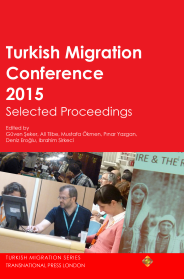Language Trouble within Ethnic Households: “Never Speak Their Mother Tongue Near Children!”
Language Trouble within Ethnic Households: “Never Speak Their Mother Tongue Near Children!”
Author(s): Yaprak Civelek
Subject(s): Language studies, Sociolinguistics, Cultural Anthropology / Ethnology, Social development, Migration Studies, Identity of Collectives
Published by: Transnational Press London
Keywords: Turkey; mother tongue; language; children; ethnicity; ethnic household; identity;
Summary/Abstract: In ethnic households, concern for children is the leading factor pushing parents to speak the official language to ensure their children’s success in public schools, especially with the thought, “we never wish them to go through what we went through in the past.” In the official discourses, Turkishness has been superior over other ethnic identities since the 1920s: the language rights of the Jewish, Greeks, and Armenians living in Turkey have been guaranteed by the 1923 Treaty of Lausanne; however, the government recognizes only these three non-Muslim groups as minorities. Tevhid-i Tedrisat Kanunu (the Law of Unification of Education) implemented in March 1924 is also part of the strategy for achieving national unity and integrity by Turkifying all ethnic groups in Anatolia. In 1934, İskân Kanunu (The Settlement Law) was supposedly passed to address new arrangements for migration and population issues; however, these “arrangements” were obviously reflecting a monolingualistic approach, and the Law directly targeted assimilating the Kurds and their language (Beşikçi, 1991).
Book: Turkish Migration Conference 2015 Selected Proceedings
- Page Range: 356-368
- Page Count: 13
- Publication Year: 2015
- Language: English
- Content File-PDF

